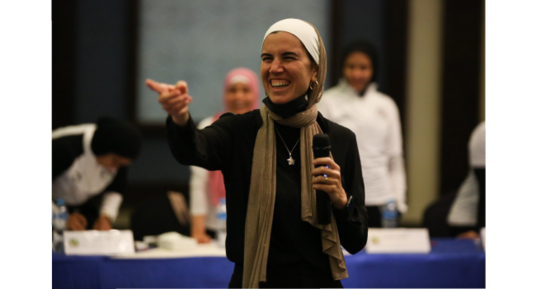
Safia Abdeldayem
Current Position: Head of Women’s Football Development, CAF
Year of graduation: 2014 (14th edition)
Nationality: Egyptian/Syrian
What does your current role involve?
I have been at CAF since November 2018. CAF is the Confederation of African Football and has 54 Member Associations (MA). The Women’s Football development department was inaugurated in 2018 and that was the first official kick-off for any football developmental activities for women’s football on the continent.
It was a challenge adapting to the new reality because even though the oldest women’s competition had started in 1998 there was no official data for any women’s football related activities on the continent and so the first year was all about understanding the landscape, infrastructure, and realities of women’s football in each MA. We had to hold bilateral meetings, we visited MA’s and zonal unions as well as having discussions with a few national team players and coaches. The result of this was eventually organizing our women’s football strategy taskforce in cooperation with FIFA, which was a workshop held with the intention of gathering all women’s football stakeholders, such as journalists, coaches and marketeers, for example, and setting five main priorities to develop women’s football on the continent. The outcome of this was our women’s football strategy which we now use as our guide for all of our activities until 2023.
My department works closely with our MA’s to strengthen their women’s football ecosystem. This is done through capacity building for administrators, coaches and instructors. We provide our women in football and other personnel in women’s football with the necessary tools such as workshops and courses which will empower them. These workshops also provide the participants with practical tools, offer ideas for services and other support to enable them to further strengthen women’s football in their MA’s.
We also work closely with all CAF divisions to implement areas of our strategy that need to be organized and executed with their areas of expertise. An example of this could be creating the CAF Women’s Champions League proposal, which was discussed with the Competitions Division, then approved by the EXCO and finally executed by the Competitions Division.
Which aspects of the FIFA Master course have helped you most in your career?
The FIFA Master was a very enriching experience for me. The diversity of students in class from both their professional and personal backgrounds opened my eyes to different cultures, different problem-solving methods and also highlighted equally my weaknesses and strengths. This in return has helped me immensely while working in an international football setting as it has made me more tolerant and understanding of how others react and think.
At the same time, the combination and variety of the different FIFA Master modules has vastly impacted my professional experience. They gave me a deeper understanding of the structures within our sporting entities which has influenced my decision-making processes in many instances as well as highlighted the importance of sport in society and politically.
Moreover, the network one builds is a massive strength that you simply get by being part of the FIFA Master. The bond that you create with other alumni is very difficult to explain but what I know and can attest to is that your former classmates and alumni will always assist you one way or another. This can be as a simple as a contact needed or as difficult as finding a job opportunity to fit your experience.
Overall, it was an experience which I came out of as a more mature and balanced individual.
What advice would you give to future students on the course?
I would advise them to enjoy every aspect of the FIFA Master journey. Get to know your classmates personally, understand what they did professionally and enjoy the time you spend with them because for that year you really need to just enjoy and be there because it will never be repeated. Network with other alumni you meet across all modules as well as guest speakers and get to know about their experiences too.
In the end, be true to what you really want out of the FIFA Master. You need to always remember why you applied, your vision could change as to what you want to do in the future, but always remember what motivated you to be on the course in the first place. Also, don’t apply to a job just because you have to. Apply to what you see yourself doing and enjoying in the future.
And finally, always remember that after you have completed your FIFA Master studies you will have a set of skills that many people already in the sports industry don’t have. So, don’t panic and just enjoy the job-hunting process.
FIFA Master - International Master in Management, Law and Humanities of Sport, ranked No.1 Course in Europe 2012, 2013, 2014, 2015, 2017, 2018, 2019, 2020 and 2021 by the SportBusiness International global rankings.
Organised by CIES in partnership with De Montfort University (United Kingdom), SDA Bocconi School of Management (Italy) and the University of Neuchâtel (Switzerland).
This website uses cookies – limited to technical and analytical cookies – in order to allow your browsing and enhance your experience.
For more information, please see our cookie policy and our privacy notice.